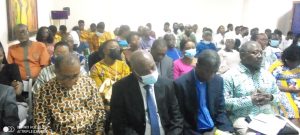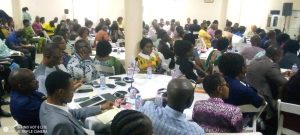We must protect Children in their communities against abuses/ Frederick Barasa program manager American bible society

We must protect Children in their communities against abuses/ Frederick Barasa, USA
The Trauma healing community of practice conference held at coconut hotel in Accra Ghana.
The Girls and boys in Ghana still experience frequent and multiple forms of physical, emotional, verbal abuse and violence.
According to Frederick Barasa program manager American bible society Philadelphia, USA, Said, the Child Protection baseline research report indicates that when children were asked about their experiences of physical discipline, over 57 per cent of respondents (aged 14-17 years) said they were beaten at home “all the time” or “sometimes”, while 34 per cent confirmed being beaten in school by the teacher in the last month. 
He, said, this appeared to be the case for both girls and boys, in rural and urban areas.
The cost of child abuse is enormous Short-term consequences include medical issues and the need for social welfare interventions, and long-term consequences are compromised physical health, absence at school and psychological impact on the child.
The financial burden of child abuse in Ghana was estimated at more than USD 200 million per year or 1 per cent of Ghana’s GDP.
He added that, the estimated total number of children who have been physically or emotionally abused was noted at 3.4 million in Ghana. Issues that impede the prevention of violence against children include:
Issues that impede the prevention of violence against children include:
He said, Social norms accepting and promoting the use of violence in schools, homes and other institutions as an effective way to manage the behavior of children.
Laws permitting the use of “reasonable” punishment by parents against children.
He added, Insufficient allocation of resources to prevention and response programmes in all spheres.
Inadequate capacity of key government actors – including social workers, teachers, police,
The prosecution and courts to prevent and respond Lack of timely and continuous specialized management of child protection cases of violence.
Cultural practices inhibiting the ability of survivors of violence to come forward.
Poor quality of care given to survivors of violence, which may put them to greater risk.
Story by Fada Amakye from Daily Sun.





